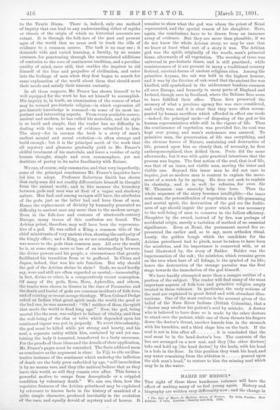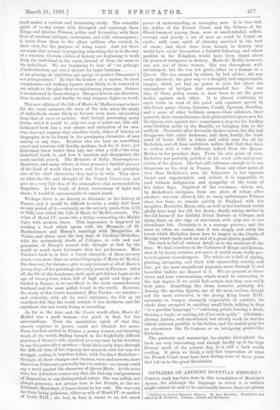MARIE DE' MEDICI.* THE sight of these three handsome volumes
will have the effect of making many of us feel young again. History and biography are written very differently now ; and the change in
• The W of Norio do Medicis, Queen of France. By Julia Pardoe. New s
Edition. C Tole, London ; Bentley and Soc. MO.
itself makes I curious and interesting study. The scientific spirit of to-day treats with disregard and contempt these Kings and Queens, Princes, nobles and favourites, with their lives of constant intrigue, excitement, and wild extravagance ; It turns from them to the silent millions who existed, in their view, for the purpose of being taxed. And yet there are signs that science is preparing something for us in the way of a reaction. Certain critics of history are beginning to work from the individual to the mass, instead of from the mass to the individual. We are beginning to hear of " un principe d'individuation, qui cr6e mesure lea types humains et un piincipe de r6petition qui agrege et souleve Phumanit6it ces protagonistes." So that the leaders of a nation, its most conspicuous and striking figures, seem likely to be restored in our minds to the place they occupied many years ago. Science is accustomed to these changes. She goes first in one direction, then in another; and finally, we may suppose, lights on truth.
This new edition of the Life of Marie de' Medici seems to have hit the exact moment, the turn of the tide, when the study of individuals seems likely to become even more interesting than that of races or nations. And though possessing many faults, which it would be only too easy to point out, this old- fashioned book has a real charm and attraction of its own. One does not suppose that absolute truth, either of history or biography, is to be found in the gossipping chronicles of any society or any time. Readers who are bent on something exact and accurate will hardly, perhaps, look for it here; yet historians know better than any one what a will-o'-the-wisp historical truth is, and how it deceives and disappoints the most careful search. The Memoirs of Sully, Bassompierre, Rambure, and many others, at least present a faithful picture of the kind of world they knew and lived in, and probably also of the chief characters they had to do with. They show -us what the life and thought of the French Court was, and give us a very fair idea of the atmosphere that surrounded its Royalties. As for truth of detail, correctness of light and shade, it would be unreasonable to expect much.
Perhaps there is no history so dramatic as the history of France, and it would be difficult to write a really dull book on any period of it,—certainly on the seventy years, from 1572 to 1642, over which the Life of Marie de' Medici extend-s. The reign of Henri IV. seems like a bridge connecting the Middle Ages with modern times. This impression is deepened by reading a book which opens with the Massacre of St. Bartholomew, and Henry's marriage with Margarite de Valois, and closes near the last, days of Cardinal Richelieu, with the melancholy death at Cologne, in exile and real privation, of Henry's second wife, thought at first by the world so much more fortunate than her predecessor. Miss Fardoe's book is, in fact, a Court chronicle of these seventy years, even more than an actual biography of Marie de' Medici. She does not, for instance, give us any account at all of Marie's young days, of her parentage, her early years in Florence. After all, the life of this handsome, dark eyed girl did not begin at the age of twenty-four, when, full of high spirit and hope, she landed in France, to be sacrificed to the most unsatisfactory husband and the most selfish Court in the world. However, the study of this Court fascinated Miss Pardoe—no wonder— and evidently, with all its cruel intrigues, she felt as its courtiers did, that the world outside it was darkness, and life anywhere else not worth living or recording.
As far as the time and the Court would allow, Marie de' Medici was a good woman,—too good, in fact, for her surroundings. Even the scandalous spirit of that day, almost supreme in power, could not blemish her name. From her first arrival in France, a young woman, not knowing much of the world, finding herself in the frightfully difficult position of Henry's wife, insulted at every turn by his devotion to one favourite after another,—from these early days, through the difficult time of her regency, her quarrels with her son, her struggle, ending in hopeless defeat, with Cardinal Richelieu— through all these changes and chances, wars and sorrows, more
than even Princesses generally have to endure—no enemy could say a word against the character of Queen Marie. At the same time, her defenders cannot say that she bad any real greatness of disposition or any distinguished talent She was selfish, not always generous, not always true to her friends, as the un- fortunate Marechale d'A.nere found to her cost. She was very far from being judicious, either as wife of Henri IV. or mother of Louis XIII.; she had, in fact, it seems to us, not much
power of understanding or managing men. It is true that the nobles of the French Court, and the Princes of the Blood foremost among them, were as small-minded, selfish, corrupt, and greedy a set of men as could be found on earth ; still, some spirit of chivalry survived in the best of them ; and there have been women in history who would have made themselves a faithful following, and whose position in the Kingdom would have been raised abor e the power of intriguers to destroy. Marie de' Medici, however, was not one of these women. She was throughout well- intentioned ; but she was not great, either as a woman or a Queen. She was swayed by whims, by bad advice ; she was easily deceived ; she gave way to a haughty and ungovernable temper, which yet had no power to raise her above the atmosphere of intrigue that surrounded her. Her one idea of State policy seems to have been to set the great nobles against each other. It is almost confusing to one's brain to read of the quick and constant moves in this Court game—Guise, Soissons, Cond6, Epernon, Bouillon, and a score of other brilliant names—their alliances, their quarrels, their reconciliations, their plots and intrigues, now for the Queen, now against her ; sometimes a step too far landing some luckless noble in the Bastille, or bringing him to the scaffold. Favourite after favourite flashes across the sky and disappears into outer darkness ; and then, finally, the weak mind of Louis XIII. is taken and ruled once for all by Richelieu, and all these ambitious nobles find that they have to reckon with a ruler different indeed from the Queen. Motherin her proudest days. From his own point of view, Richelieu was probably justified in. his cruel exile and perse- cution of the Queen. She had still influence enough to be too dangerous as his rival in France. From any other point of view than Richelieu's own, his behaviour to her appears brutal and unprincipled; and, indeed, it is impossible to read without indignation and sympathy of the trials of her latter days. Deprived of her revenues ; driven. out, by Richelieu's intrigues, from one place of refuge after another; not even allowed, like so many unfortunate Princes since her time, to remain quietly in England with her daughter, Henrietta Maria, who, as well as her husband, would gladly have kept her till her death ; finally taking shelter in the old house of her faithful friend Rubens at Cologne, and dying there on the edge of starvation, with only one or two attendants left. Certainly it is a strange picture ; and the more so when we realise that it was simply and solely the terror which Richelieu knew how to inspire in the Courts of Europe which made such an end of a great Queen possible.
The book is full of curious detail as to the manners of the time. We find ourselves in the Cabinets of Kings and Queens, shut in by heavy curtains, yet never, it would seem, really pro- tooted against eavesdroppers. The whole air is full of spying, plotting, intriguing, and thick with immorality, cruelty, and lies ; yet the most magnificent pageants move through it, and beautiful ballets are danced in it. We are present at inter- views, and hear conversations, which would be interesting to the last degree if we could feel certain that they ever really took place. Something like them, however, probably did. Among the moving figures, one of the most curious, though not the most attractive, is the young King Louis XIII., saturnine in temper, strangely respectable in conduct, his whole time occupied in catching small birds, talking to dogs "in a peculiar language,"—" colouring prints, beating a drum, blowing a bugle, or making jets d'eau with quills." Obstinate, gloomy, jealous, well-intentioned, but utterly weak, he was the oddest contrast possible to his father, and the easiest prey for an adventurer like De Luynes, or an intriguing genius like Richelieu.
The portraits and manuscript fac-similes throughout the book are very interesting, and though hardly up to the high literary mark of the present day, it is still a book worth reading. It gives, we think, a very fair impression of what the French Court must have been during some of those years that led on to the great Revolution.



































 Previous page
Previous page